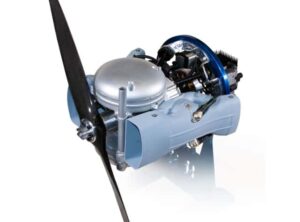


 Northwest UAV has confirmed that its NW-88 Engine has been integrated with five new UAV (unmanned aerial vehicle) platforms, and that it has completed flight testing with several of these, accruing hundreds of flight hours throughout 2021. Continued-development test flights are planned for all aircraft throughout the coming year, and initial field deployments have been scheduled.
Northwest UAV has confirmed that its NW-88 Engine has been integrated with five new UAV (unmanned aerial vehicle) platforms, and that it has completed flight testing with several of these, accruing hundreds of flight hours throughout 2021. Continued-development test flights are planned for all aircraft throughout the coming year, and initial field deployments have been scheduled.
Borrowing design elements from their aviation-grade NW-44 Heavy-Fuel Engine, NWUAV was able to complete prototyping and thousands of hours of testing of the NW-88 Engine in just a few years. The NW-88 offers a conformal, low-drag design, which results in high climb rates and greater endurance, while performing extremely well on heavy fuel through all operational scenarios. Manufactured almost completely in the US and largely in-house, both the NW-88 and NW-44 have minimal exposure to supply chain issues and easily comply with the DoD’s “Buy America Act.” Easily configured to fit existing aircraft, the NW-88 supports fixed wing aircraft in the 75-150 lb range that require the use of heavy fuel and a modular power system that is ready to deploy with minimal modification, if any, reducing integration costs to the end user.
The NW-88 has recently gained interim flight clearance from NAVAIR (Naval Air Systems Command), and executed multiple test flights and operational demonstrations, including ISR and delivery applications with multiple platforms. In the upcoming year NWUAV plans to undertake continued endurance testing, test flights, and global field operations for multiple customers.
Northwest UAV’s current R&D project is the development of their largest heavy-fuel engine yet, the NW-230. Expected to provide 16-19 hp (rpm/propeller dependent) and 1,500 watts of electrical power at flight idle, the NW-230 Heavy-Fuel Engine is under development and will begin initial testing later this year.
Chris Harris, President and Owner of NWUAV, commented: “Listening to the industry and our contacts in defense organizations, we learned that certain missions weren’t being flown. Not because they aren’t significant missions, but because they didn’t have the appropriate engine to meet the mission requirements. Reliability typically topped the list as a deficiency with fuel efficiency right behind it, specifically when trying to burn heavy fuels reliably at extreme temperatures and altitudes, which is critical to satisfying the future tactical unmanned aircraft requirements of the warfighter.”
“The NW-88 checks the box for those specific deficiencies, while also being easy to operate, integrate and maintain having pulled many of the key attributes and proven components from our combat-proven NW-44 engine. Our development group did a great job designing this engine and getting it into production in a relatively short timeframe, saving end users from many of the costly pitfalls associated with heavy fuel.”
Jeff Ratcliffe, NWUAV’s Senior Director of Business Development and Technology Transfer, noted: “Having an aviation-grade, ready-to-deploy system that is easily configured for their application, and an experienced engineering team to assist with integration has delivered unprecedented timelines to get our customers out into the field and serving end users at scale. That’s important because these aircraft have the potential to change how so many current missions are accomplished and it opens the doors to new mission sets where requirements have gone unmet.”
“Our customers and their end users have seen the potential of this size of aircraft for a while, and now the NW-88 Engine has helped make it a reality. The promise of unmanned systems is the ability to optimize a vehicle precisely for the mission and that’s ultimately what we’re enabling at Northwest UAV – we’re engineering the future of UAV propulsion to make it easier for the UAV industry to adapt, innovate, and grow.”





Related Posts
New Drone Fires Thales Missile in Unmanned Air Combat Milestone
UAS Startup Accelerator Awards 3M in Funding
US Navy Orders Unmanned Tactical Resupply Aircraft